What is an Abstract?
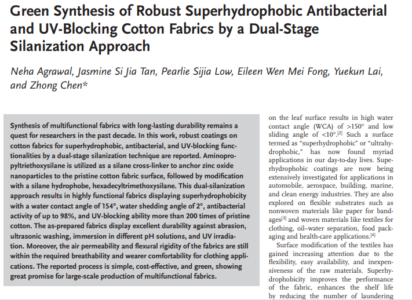
What are the features of an Abstract?
1. Abstract reflects all major sections
An abstract serves as a summary of your article, representing each major section of your research paper.
If your report has sections like Introduction, Methods/Materials, Results, and Conclusion, your abstract should reflect all these sections in a condensed form.
In the example shown below, the sections are underlined as per the following colours. Introduction – blue, Methods/Materials – yellow, Results – green and Conclusion – red.
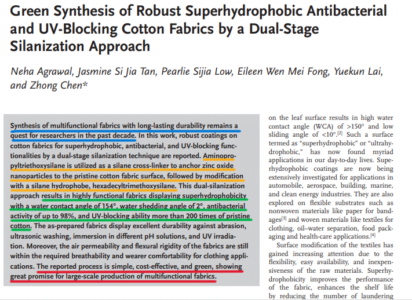
2. Abstract is concise
It highlights only the key points from each section without including unnecessary information. Usually limited to 150-250 words.
3. Abstract is self-contained
Even with the limited word count, the abstract is a standalone section.
It provides a complete understanding of the research without requiring additional details or supporting information from the rest of the article.
4. Abstract should be written last
Although it appears at the top, the abstract is best written after completing the entire research paper.
By writing it last, you can easily extract and summarize the key points from each section, making the process more straightforward.
To know in detail about this check out the video below –
How To Write an Abstract?
The abstract can be divided into 5 main components –
- Introduction
- Problem Statement
- Approach
- Results & Discussion
- Conclusion.
Let’s understand what needs to get covered under each of these in detail.
1. Introduction:
This is where you provide the context for your research. Explain why the topic is important and why it needs to be addressed. What motivated you to take up this research? Was there a specific gap in the field that drew your attention, or is the problem particularly relevant in today’s context?
In the following example – Product Design of Hydrogen Sensing System, the need for hydrogen gas is first established and then the importance of having a good hydrogen sensing system is also mentioned. This sets the context of why this research is important in today’s world
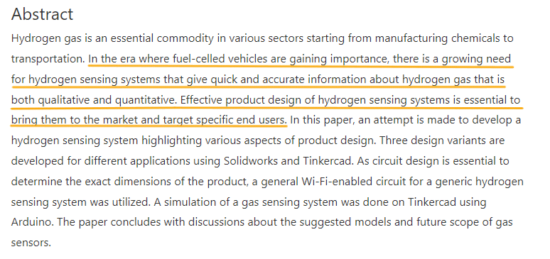
2. Problem Statement or Objective:
In this section, clearly define the research gap. This sets the foundation for your objective, where you briefly describe what your research aims to achieve. Make sure to tie this back to the problem—how will your research solve this issue or move the field forward? Be specific but concise.
3. Approach or Procedure:
Here, describe the methodology you used to tackle the problem. What approach did you take to gather data or test hypotheses? This section is meant to provide the reader with an idea of how you approached the problem without going into extensive detail.
In the below example (Green Synthesis of Silver Nanoparticles, Their Characterization, Application and Antibacterial Activity), the underlined portion describes the methodology used in the research.
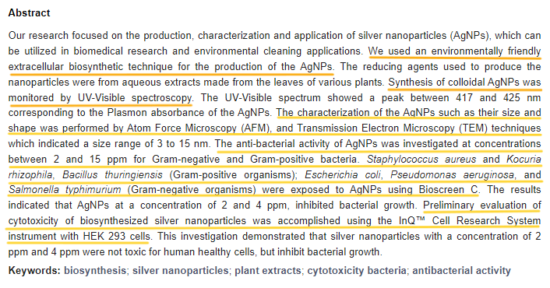
4. Results and Discussion:
Focus on the most important findings of your research that helped you reach your objective. Highlight only the key results that contribute to solving the research problem you defined earlier. Discuss briefly how these results contribute to the field and their relevance to your objective. This is where you show the reader that your methodology worked and provided meaningful insights.
5. Conclusion:
Finally, wrap up with a summary of how your research contributes to the broader field. Be specific about the value your research adds, whether it’s filling a gap, introducing a novel approach, or laying the foundation for future work. Keep the tone professional and focused on genuine contributions, avoiding overstatement.
The below example, results are underlined in yellow and conclusion is underlined in red.
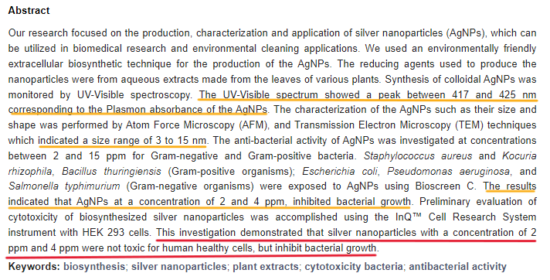
To have a hands on experience in writing an abstract for a research paper, you can check out the video below:
In conclusion, crafting an abstract is a manageable task once you’re familiar with the essential components to include. For research proposals where Results and Discussions are not yet available, simply omit this section and focus on the other key elements. With these guidelines, you’ll find that writing an abstract becomes a straightforward process!
To learn in detail on how to write an abstract and the entire research paper, you can enroll for our course – The A-Z of Research Paper Writing & Presentation
For any queries related to this blog, feel free to comment and we will try to get back to your at the earliest!




